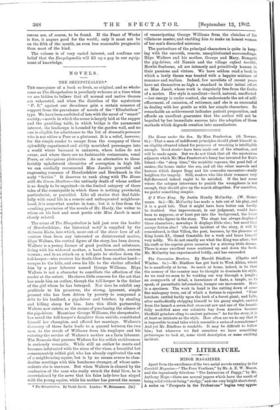NOVELS.
THE SHEEPSTEALERS.*
THE emergence of a book so fresh, so original, and so whole- some as The Sheepstealers is peculiarly welcome at a time when we are bidden to believe that all normal and native themes are exhausted, and when the diatribes of the mysterious "P. S." against our decadence gain a certain measure of support from the prevalence of novels of the "Elizabethan" type. We have been surfeited of late with the novel of "smart" society,—novels in which the scene is largely laid at the supper and the gambling table, in which bridge is the paramount interest, the landscape is bounded by the garden wall, and no one is eligible for admittance to the list of dramatis personae who is not either a Peer or a plutocrat. It is a relief, however, for the simple reader to escape from the company of these splendidly caparisoned and richly nourished personages into a world where baccarat is unknown, where ladies do not swear, and where there are no fashionable restaurants, venal Peers, or obsequious plutocrats. As an alternative to these lavishly upholstered chronicles of corruption in high life we can cordially recommend Miss Jacob's powerful and engrossing romance of Herefordshire and Breclmock in the early "forties." It deserves to rank along with The House With the Green Shutters—the untimely death of whose author is so deeply to be regretted—in the limited category of those tales of the countryside in which there is nothing provincial, particularist, or parochial. Like all stories that deal faith- fully with rural life in a remote and unfrequented neighbour- hood, it is somewhat sombre in tone ; but it is free from the crushing pessimism of the novels of Mr. Hardy, the writer to whom on his best and most poetic side Miss Jacob is most closely related.
The scene of The Sheepstealers is laid just over the border of Herefordshire ; the historical motif is supplied by the Rebecca Riots, into which, more out of the sheer love of ' ad- venture than from any interested or disinterested motive, Rhys Walters, the central figure of the story, has been drawn. Walters is a young farmer of good position and substance, living with his widowed mother, a hard, honourable, austere woman; and in an attack on a toll-gate he strikes down the toll-keeper—who receives his' death-blow from another hand— escapes to the hills, and owes his life to the shelter afforded him by a poor labourer named George Williams. Rhys Walters is not a character to conciliate the affection of the reader at the outset. He shows little remorse for the act that has made him an outlaw, though the toll-keeper is the father of the girl whom be has betrayed. Nor does he exhibit any gratitude to his preserver, the strong, ignorant, simple peasant who has been driven by poverty to compound a debt to his landlord, a pig-driver and butcher, by stealing and killing sheep for him. Into this illicit partnership Walters now enters, as the means of purchasing the silence of the pig-driver. Meantime George Williams, the sheepstealer, has saved the toll-keeper's daughter from suicide, constituted himself her champion, and offered her marriage. Walters's discovery of these facts leads to a quarrel between the two men, to the revolt of Williams from his employer and his entering the service of Walters's mother as a farm labourer. The Nemesis that pursues Walters for his selfish recklessness is curiously romantic. While still an outlaw he meets and becomes infatuated with the niece of the vicar, a beautiful but consummately Selfish girl, who has already captivated the son of a neighbouring squire, but is by no means averse to clan- destine meetings with this handsome stranger, of whose ante- cedents she is unaware. But when Walters is cleared by the confession of the man who really struck the fatal blow, be is overwhelmed by the news that his false lady-love has eloped with the young squire, while his mother has preyed the means • The Sheepteaters. By Violet Jacob. London: W. Henamana. - of emancipating George Williams from the clutches of his villainous master, and enabling him to make an honest woman of her son's discarded mistress.
The portraiture of the principal characters is quite in keep- ing with the uncouth, remote, unsophisticated surroundings. Rhys Walters and his mother, George and Mary, Bumpett the pig-driver, old Nannie and the village enfant terrible, Howlie Seaborne, all are intensely and primitively human in their passions and virtues. We have seldom read a book in which a lowly theme was treated with a happier mixture of romance and realism. Indeed, few novelists of recent years have set themselves so high a standard in their initial effort as Miss Jacob, whose work is singularly free from the faults of a novice. Her style is excellent—lucid, natural, unaffected —her energy is under control, she understands the art of self- effacement, of omission, of reticence, and she is as successful in dealing with her gentle as with her simple characters. So remarkable an achievement indicates patient preparation, and affords an excellent guarantee that the author will not be beguiled by her immediate success into the adoption of those methods which degrade creation into manufacture.






































 Previous page
Previous page